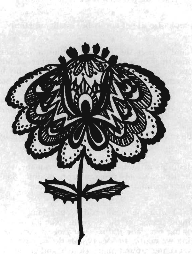Articles/Essays – Volume 06, No. 2
Single Voices: Journal Jottings
The Victorian Ideal of Womanhood doesn’t seem so disadvantageous to girls thrust into a hostile world “on their own.” When you remain single, society takes away the advantages of being a girl and forces upon you the disadvantages of being a man—so you are neither and are lost in the void.
***
It is difficult to talk about the advantages of being single since after a certain age it cannot properly be considered to be a blessing, though it well may be. All the advantages seem temporal and selfish, character-softening, and of diminishing value. Others, who tend to judge righteousness in terms of pitifulness (“It’s not her fault, she wants to marry.”), tolerate only facetious exultings in the unencumbered life, for to be seriously exultant is to be instantly suspected of unrighteousness. To be too happy brings judgment, yet being too obviously unhappy is criticized just as severely. Job’s comforters never had it so good!
***
It’s a buyer’s market, one may as well face it. G. gave me this, from As you Like It (though I don’t):
Mistress, know yourself. Down on your knees,
And thank heaven, fasting, for a good man’s love;
For I must tell you friendly in your ear,
Sell when you can! You are not for all markets.
Cry the man mercy, love him, take his offer,
Foul is most foul, being foul to be a scoffer. (Act III, Scene V, Lines 557-62)
Bewilderment is the main feeling. How does everyone else do it? And why can’t I?
***
The post-college single L.D.S. girl on the outer rim of nubility is aware of being in the right church but the wrong pew. Neither a priesthood bearer nor a childbearer, her presence becomes increasingly embarrassing, unless she has the good fortune of being in a predominately singles ward.
***
Marriage: to be determined not to be determined by it is also to be determined by it.
***
A year ago, away from home for Christmas, bronchial, and feeling keenly homeless, I re-read Little Women. My grief astounded me: I wept and wept and could not be consoled, not because Beth died (it seemed right that she should on this reading), not because Jo wouldn’t marry Laurie, but because it was irrevocably clear to me that, of the four models for girlhood and womanhood presented by Louisa May Alcott, it was Amy who was the embodiment of all that was good, not Beth; Amy who triumphed, not Jo; Amy who deserved admiration and emulation, not Jo or Beth or the docile Meg. My grief was from shock and disappointment at having been so long and confidently wrong, from a horror of prolonged and disasterous self-deception. Perhaps other girls were perspicacious enough at nine or ten to realize that Amy was the one they wanted to be like. Perhaps they were half in love with Laurie and wanted to marry him and live happily ever after. I wasn’t that insightful. I thought Amy a horrid, selfish little person quite deserving of the fate of marrying Laurie, whom I did not admire or find attractive; I accepted Jo’s refusal of him as just in the largest sense, though heroic and sad too. Now I could see that while Jo reared Laurie, it was Amy who brought him to his best self, Amy who was the real “Little woman.” The grief is real: I am not an Amy. I do not like or admire Lauries, and there simply are not enough German profesors to go around.
***
I am someone to whom movies like “Gigi” and “My Fair Lady” appeal psychologically—fulfill all fantasies . . . wanting to be the toad who is dis covered by the Prince and magically changed into a princess. Not wanting to be found by another toad . . . and accepted with resignation.
***
Out of the context and structure of family, the individual loses her meaning. There are so many other beings, how can God care about me? What about all those others on the subway? Within the family, with father or husband representing the Lord, she matters; she knows it, and the security is vital to a clear perspective. Family Home Evening groups in university wards are a worthwhile attempt to compensate for not being properly organ ized into a proper family.
***
Faith is dating boys who, when they ask, “Is there someone else?” can only be answered, “There’s got to be.”
Faith is buying only dresses with sleeves.
Faith is knowing you would like polygamy.
Faith is crying a little bit when your Bishop tells you that had you been Eve you never would have eaten that apple.
Faith is dressing up and attending your ninetyninethousandth M.I.A. social.
Faith is not contracting spiritual pneumonia from the cosmic chill blasting in from eternity.
***
There is something to be remarked in coming home from a fairly satisfying Sunday School and a better than good Relief Society and instantly feeling the need to play Peggy Lee’s, “Is That All There Is?”


 Back to full Issue
Back to full Issue

